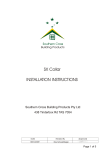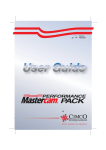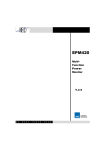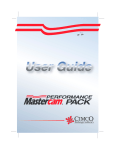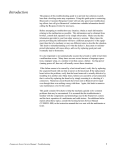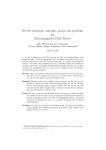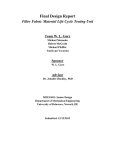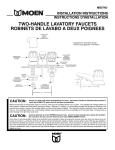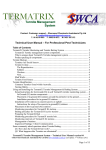Download retic operators manual aug 2013 ver 9
Transcript
SX Reticulation System Product Manual (Incorporating Installers Guide) June 2014 ABN 46 124 306 163 438 Tinderbox Rd Tinderbox Sydney 5 Mayvic Rd Greenacre M: 0400 562 356 Melbourne 5 Gasoline Way Craigieburn T: 1300 929 626 Brisbane 35 River Rd Redbank F: 03 6229 6383 Tasmania 7050 Adelaide 2 Wilford Ave Underdale www.scbp.com.au Perth 524 Abernethy Rd Kewdale E: [email protected] Contents P 3 - ...... Introduction P35 - ...... Exclusions P 4 - ...... Accreditation P36 - ...... Limitations P 5 - ...... Record keeping / traceability P37 - ...... Landscaping P 6 - ...... Terms of Use P38 - ...... Equipment P 7 - ...... System Overveiew P39 - ...... Chemicals P 9 - ...... Component Specifications P41 - ...... Charging the System P17 - ...... System Assemby P43 - ...... Notices / Documentation P18 - ...... Safety P45 - ...... Property Owner Information P20 - ...... Soils P46 - ...... Warranty P21 - ...... Installation SX Reticulation Product Manual Copyright Southern Cross Building P roducts P/L 2010 Version 2 - Aug 2013 Introduction Reticulation systems have their origins in agriculture where it evolved from simply delivering water to plants to now carrying nutrient solutions and insecticides in many different applications and environments. For over 20 years delivering termiticides through a reticulation pipe has been used as a treatment method for protection of buildings. In the current Australian Standard AS 3660.1 - 2000 reticulation systems are acknowledged as a deemed to satisfy method principally under section 8 “Deemed to Satisfy Requirements - Chemical Soil Barriers” The SX reticulation system has been independently tested and acknowledged as meeting the deemed to satisfy requirements of AS 3660.1 - 2000 This guide describes the components of SX reticulation system and the principles of installing the system correctly. The components developed for this system are high quality and have been tested to ensure that they will work as designed. Every job is different, some may have diffiult designs, others have difficult conditions such as soil type, this means the success of the barrier will often depend on the skills and training of the installer. Installers must be alert to situations where an installation will not be effective. This guide highlights many, but certainly not all problem situations that may arise. It is essential that installers are familiar and adhere to the limitations described in the specifications section of this guide. Providing an effective barrier may mean combining or incorporating other products, or it may be necessary to refer the problem back to the builder for rectification or re-design. Thankyou for taking the time to find out about SX Reticulation Systems. SX Reticulation Product Manual Copyright Southern Cross Building P roducts P/L 2010 Version 2 - Aug 2013 Installer Accreditation SCBP Supplies Accredited Installer Co. Nominates Supervisor. Accredited Installer Company Supervisor A “Supervisor” is a person who is responsible for all aspects of the installation of the reticulation systems. They are responsible for Training of staff including being readily accessible to people working under their supervision. Supervision of pipe laying, Design of a system (length of ‘runs’ positioning of boxes etc) Establish and monitor systems to ensure correct ‘pump ups’ Records including treatment certificates Skills: Holds Cert 3 in Pest control or above. National Competency PRMPM05; 06; 18; 8 and 10 Is familiar with the SX Reticulation Installers manual Familiar with AS 3660.1 2000 Supervises Chemical applicator The chemical applicator is a person responsible for ‘pumping the system’. This work must be consistent with competencies PRMPM05; PRMPM06; PRMPM18; PRMPM8 and PRMPM10 Holds Certificate 3 in Pest Management or above. National Competency 5; 6; 18; 8 and 10 Has been trained in pipe installation by the supervisor Has been trained in chemical application (”pump ups”) by the supervisor. Pipe Installer The pipe installer prepares a site and lays pipe; installs pump up points prior to a ‘pump up’ Completed pipe installation training. Works under supervisors supervision The pipe installer must be either an employee or a contractor, where they work under the direct supervision of the supervisor. The supervisor is available for advice and inspection of the final installation. Where the installer is a contractor they must carry the same qualifications and equivalent PI & PL insurance as the prime contracting company SX Reticulation Product Manual Copyright Southern Cross Building P roducts P/L 2010 Version 2 - Aug 2013 Record Keeping Traceability . We are required to be able to trace our products through to their end use. This means we must be able to contact installers of our products in the event of a product recall or essential technical update. It is SCBP policy not to collect installation certificates, builder details or home owners details from you. We acknowledge that customer lists and lists of work done is commercially valuable and sensitive information. However, when you agree to the “Terms of Use” you are agreeing to maintain your records so that you can trace where our products to where they have been used if the need ever arose. SX Reticulation Product Manual Copyright Southern Cross Building P roducts P/L 2010 Version 2 - Aug 2013 Terms of Use Installers agree to the following terms of use for Southern Cross Buuilding Products components and systems. Installers shall..... follow SCBP Installation Guidelines for products comply with the BCA; relevant Australian Standards and Chemical product labels maintain documentation and a system which allows traceability only allow properly trained, licensed and accredited people to install and maintain systems use only components supplied by SCBP SX Reticulation Product Manual Copyright Southern Cross Building P roducts P/L 2010 Version 2 - Aug 2013 Reticulation system overview SX Reticulation is a system designed to distribute pesticides around the base of buildings to form a termite barrier in accordance with Australian Standard AS 3660.1 2000 (Section 8). SX Reticulation is a “Deemed to Satisfy Product” this means that the system and its components have been assessed against the performance criteria in AS 3660.1 - 2000 The pipe is placed at the base of the concrete slab, very close to the edge or even clipped on to the slab. The pipe is just under the finished ground level (FGL) or just below concrete or pavers SX Reticulation is chemical resistant pressure pipe with emitter holes at regular spacings. The system is assembled using pressure fittings generally clamps are not necessary as the system should be pumped at relatively low pressure. The pipe is flexible and strong and generally does not require “elbows” for bends, however “end stops”; “connector fittings” and “valve boxes” are essential. When a system is “charged” pesticide is pumped through the pipes at pressure, the pesticide is released from the pipe in a controlled manner and the surrounding soil absorbs the pesticide forming a barrier. People and companies wanting to use this system must ensure they have the appropriate training and state licences. These requirements vary from state to state. SX Reticulation Product Manual Copyright Southern Cross Building P roducts P/L 2010 Version 2 - Aug 2013 Product Specifications - PIPE Highly Chemical Resistant SX reticulation pipe is a high quality chemical transfer pipe specifically engineered for use by industry and pest controllers for transfer of diluted pesticides including solvent based solutions. A PVC Nitrile blended compound ensures that the pipe has high levels of chemical resistance and a long service life. Kink Resistant SX Reticulation pipe has a wall thickness of 3.25mm (I/D 12.5mm O/D19.0mm). The pipe is a composite construction combining a stong internal transfer tube, reinforcing fabric and durable outer coating. This means the pipe has excellent resistance to kinking even at angles greater than 90 degrees. Strong SX Reticulation Pipe has a rated bust pressure of 8.4 MPA (1100 PSI) and a working pressure of 2.1 MPA (nearly 300PSI). The working pressure of this pipe far exceeds any pressures exerted in its normal service period as a reticulation line. Installers please note; this is not the pump up pressure for the system, refer to charging the system section for full details UV Stable The outer coating of the pipe is UV stabilised to protect the pipe if construction is delayed or the pipe is inadvertently exposed. Impact Resistant The pipe is strong yet flexible giving it excellent resistance to impact damage; crushing or cutting. Emitting holes The pipe is precision drilled with two opposing holes at 200mm centres providing a radial distribution pattern. SX Reticulation Product Manual Copyright Southern Cross Building P roducts P/L 2010 Version 2 - Aug 2013 Product Specifications - Perforated Pipe Reticulation Pipe Re-order Part Number SX Kit80 80m Drilled pipe 4 Boxes; 8 endstops; 8 Connectors / caps 8 Elbows SX Retic 100 100m reel Total weight 22 kg stapped only SX Retic 200 200m reel Total weight 66kg On timber reel SX Reticulation Product Manual Material PVC / Nitrile Blend Construction Composite Layered Hose classification Premium Dimensions Pipe ID 12.50mm Pipe OD 19.00mm Pressure Working Pressure 2.1 Mpa / 297 PSI Burst Pressure 8.2 Mpa / 1190 PSI Average Pump Pressure 0.7 Mpa / 100 PSI Note this data is the pipe specification, for pump up details refer to ''Charging the System' section Chemical Resistance Excellent UV Stability Good Service Temperature -10 to +80 Copyright Southern Cross Building P roducts P/L 2010 Version 2 - Aug 2013 Product Specifications - Feeder Pipe Feeder Pipe Re-order Part Number SX Feeder 20 20 m Long Total weight 12kg stapped only Material PVC / Nitrile Blend Construction Composite Layered Hose classification Standard Dimensions Pipe ID 12.50mm Pipe OD 18.00mm Pressure Working Pressure 2.1 Mpa / 297 PSI Burst Pressure 8.2 Mpa / 1190 PSI Average Pump Pressure 0.7 Mpa / 100 PSI Note this data is the pipe specification, for pump up details refer to 'Çharging the System' section SX Reticulation Product Manual Chemical Resistance Good UV Stability Good Service Temperature -10 to +80 Copyright Southern Cross Building P roducts P/L 2010 Version 2 - Aug 2013 Product Specifications - Fittings Construction Injection Moulded PE (Polyethylene) Service Temp -10 to +80 Deg C Chemical Resistance Excellent UV Stability Excellent Packaging Bag 20; Box 200 Construction Injection Moulded PE (Polyethylene) Service Temp -10 to +80 Deg C Chemical Resistance Excellent UV Stability Excellent Packaging Bag 20; Box 200 End Stop Re-order Part Number SX END 20 SX END 200 T Junction Re-order Part Number SX Tjunc 20 SX TJunc 200 SX Reticulation Product Manual Copyright Southern Cross Building P roducts P/L 2010 Version 2 - Aug 2013 Product Specifications - Fittings 90 Degree elbow Re-order Part Number SX 90Elbow 20 SX90Elbow 200 Male connector Re-order Part Number SX MaleC 20 SX MaleC 200 SX Reticulation Product Manual Construction Injection Moulded PE (Polyethylene) Service Temp -10 to +80 Deg C Chemical Resistance Excellent UV Stability Excellent Packaging Bag 20; Box 200 Construction Injection Moulded PE (Polyethylene) Service Temp -10 to +80 Deg C Chemical Resistance Excellent UV Stability Excellent Packaging Bag 20; Box 200 Copyright Southern Cross Building P roducts P/L 2010 Version 2 - Aug 2013 Product Specifications - Fittings Construction Injection Moulded PE (Polyethylene) Service Temp -10 to +80 Deg C Chemical Resistance Excellent UV Stability Excellent Packaging Bag 20; Box 200 Construction Injection Moulded PE (Polyethylene) Service Temp -10 to +80 Deg C Chemical Resistance Excellent UV Stability Excellent Packaging Bag 20; Box 200 Dust Cap Re-order Part Number SX CAP 20 SX CAP 200 Female connector Re-order Part Number SX FEMC 20 SX FEMC 200 SX Reticulation Product Manual Copyright Southern Cross Building P roducts P/L 2010 Version 2 - Aug 2013 Product Specifications - Fittings Construction Marine Grade Stainless Steel Service Temp -10 to +80 Deg C Chemical Resistance Excellent UV Stability Excellent Packaging Bag 20; Box 200 Construction Marine Grade Stainless Steel Service Temp -10 to +80 Deg C Chemical Resistance Excellent UV Stability Excellent Packaging Bag 20; Box 200 Hose Clamp Re-order Part Number SX HoseC 20 SX HoseC 200 Cobra Clamp Re-order Part Number SX Cobra 20 SX Cobra 200 SX Reticulation Product Manual Copyright Southern Cross Building P roducts P/L 2010 Version 2 - Aug 2013 Product Specifications - Fittings Construction Injection Moulded PE (Pol ethylene) Service Temp -10 to +80 Deg C Chemical Resistance Excellent UV Stability Excellent Packaging Sold separately Valve Box Re-order Part Number SX Valve Box 6" square box SX Reticulation Product Manual Copyright Southern Cross Building P roducts P/L 2010 Version 2 - Aug 2013 Product Specifications - Fittings Construction Injection Moulded PE (Poly ethylene) Service Temp -10 to +80 Deg C Chemical Resistance Excellent UV Stability Excellent Packaging Bag 20; Box 200 Construction Injection Moulded PE (Poly ethylene) Service Temp -10 to +80 Deg C Chemical Resistance Excellent UV Stability Excellent Packaging Bag 20; Box 200 Pegs Re-order Part Number SX Pegs 20 SX Pegs 200 Saddles Re-order Part Number SXClips 20 SX Clips 200 SX Reticulation Product Manual Copyright Southern Cross Building P roducts P/L 2010 Version 2 - Aug 2013 System Assembly Fitting a Female Connector Cut the end of the reticulation pipe clean and square using a sharp blade or shears Put the clamp on the pipe first Put press the barbed end of the fitting into the pipe. Tigten the hose clamp (if required) Fitting a Male Connector Cut the end of the reticulation pipe clean and square using a sharp blade or shears Put the clamp on the pipe first Put the dust cap on to the barbed end of the connector. Press the barbed end of the male connector in to the pipe. Tighten the hose clamp (if required) Fitting an End Stop Cut the end of the reticulation pipe clean and square using a sharp blade or shears Put the clamp on the pipe first Press the barbed end of the end stop in to the pipe. Tighten the hose clamp (if required) SX Reticulation Product Manual Copyright Southern Cross Building P roducts P/L 2010 Version 2 - Aug 2013 Safety SX reticulation systems are safe to handle and install. Charging the installed system requires distribution of pesticide. Pesticides can be dangerous and their use is strictly controlled. Only people who have done specialised training (PSTM national competencies 5; 6 & 18 also known as Certificate 3) may charge the systems. Accredited installer should develop safe work method statements (SWMS) for handling storage and application of pesticides for their own operations. Some key risks are highlighted regarding handling and laying SX reticulation. Each installer is responsible for developing their own Full SWMS including handling and distributing pesticides. Job Step Hazard Risk Score SubstVery Disaster Serious Serious antial Minor Almost Certain 1 1 1 2 2 Likely 1 1 2 2 2 Possible 1 2 2 2 3 Remotely Possoble 2 2 2 3 3 Control Measure Site prep & pipe laying UV Exposure Slips falls 2 2 Correct PPE Avoid rough terrain & correct lifting procedures Movings bulk rolls Lifting strains 2 Correct Manual lifting procedures / mechanical assistance Cutting Pipe Cuts 3 Correct PPE especially Gloves Charging System Chemical Exposure 2 Follow separate SWMS for chemical use. SX Reticulation Product Manual Copyright Southern Cross Building P roducts P/L 2010 Version 2 - Aug 2013 E L P M A S SX Reticulation Product Manual Copyright Southern Cross Building P roducts P/L 2010 Version 2 - Aug 2013 Soils Soils are classified as either “sand” “silt” or “clay”. Most soils are a combination of each type. The proportion of each type material determins the soil type. Note that silt soils are sometimes referred to as “Loam” soils. The soil triangle shows the soil types according to their proportions- For example 50% clay / 50% silt is “Silty Clay”. A simple soil test can be done by taking a handful of soil, wet it with water and squeeze it. If the sample feels gritty it has a high sand content, if it feels ‘soapy’ it has high silt and if it feels ‘sticky’ it has high clay content. Now try the ‘rope test’ take the sample and and try to roll it into a small cylindrical shape like a rope. - Sandy soils will simply break up and not even form a ball. - Silt (loam) soil will feel slick and and only a little gritty it will form a ball but the ball will break apart easily and cannot be rolled onto a rope - Clay soils feel smooth and sticky, will readily form into a strong ball and can be moulded into a rope shape. Being able to identify a soil type is important because clay soils are very poor at absorbing the pesticide. A clay soil must be removed and replaced with a sandy soil before application of a pesticide SX Reticulation Product Manual Copyright Southern Cross Building P roducts P/L 2010 Version 2 - Aug 2013 Perimeter Installations Where a slab is constructed in accordance with AS 3600 and AS 2870 it is considered to be termite resistant. This means only the perimeter and any penetrations (including joints) need to be protected. This section of the guide shows the 3 steps to complete the work..... 1. Site Assessment & Site Preparation Site Assessment means making sure the site is ready for work to begin. Site Preparation means starting to plan the work and checking for design or installation issues. 2. Installation Once the site is prepared and the layout determined the pipe can be installed. The reticulation pipe is placed or clipped against the slab edge, then backfilled with appropriate soil up to FGL which should be just above the pipe. 3. Builder Home owner Notification AS3660.1 requires a" Certificate of Installation" to be given showing what work was done and what sort of maintenance is required. Unfortunately for the installer many sites will not have landscaping done and it may not be obvious to the installer what FGL will be during construction. Therefore the home owner & builder must be given appropriate advice about adjustments that may be necessary if landscaping is going to compromise the barrier. See the advice for landscapring in this guide, review your hand over documentation and speak to your insurer to be sure people are aware of maintence requirements for the reticulation system. These are the issues that are specific to this property and are additional to the standard handover paperwork. SX Reticulation Product Manual Copyright Southern Cross Building P roducts P/L 2010 Version 2 - Aug 2013 1. Site Preparations Complete any safety procedures before starting work Remove all contaminants from the area to be treated. This includes timber offcuts, building debris and formwork Check site for termite activity including timber on the ground; old fences; and trees. Check the soil on site - if inappropriate arrange for new soil. Debris; building rubble and heavy clay soil. SX Reticulation Product Manual Bricklayers mortar . Building rubble Copyright Southern Cross Building P roducts P/L 2010 Too Wet Version 2 - Aug 2013 Site Assessment Check out the building noting: position of drains, downpipes & HWS overflows the height of finished ground levels where driveways & paths will be. any change in levels any slabs or footingscast separately to the main slab Note drain adjacent to building Work out the “layout” of the system We recommend that installers use a checklist for site preparation and layouts. The checklist is a useful reminder of all the issues to deal with as well as a record of how the system is laid out. This will allow accurate drawing of “Treatment Certificates”. The form can also serve as a record of defects/issues reported to the builder. A Layout plan determines the following: position of valve boxes length of pipe runs Height the pipe needs to be fixed at given the finished ground level. Mark any issues that need to be rectified or marked as a limitation on the certificate. SX Reticulation Product Manual Copyright Southern Cross Building P roducts P/L 2010 Version 2 - Aug 2013 Site Checklist & Job Plan (example) Comment Safety Check Cleared debris Termite Check Check drains Check FGL Run lengths Box locations Access Defects notified SX Reticulation Product Manual Refer Company SWMS Removed building debis incl mortar timber and rubbish Checked trees, fences, timber on site, stumps. Checked to make sure pesticide won’t be pumped into drains Checked to make sure pipe is the correct height for the FGL Run length no more than 10m Boxes are 1m away from doors and downpipes Boxes can still be accessed after fences etc are built Identify any potential prblems with the install here. E.g. builder to ensure sand on top of pipe at driveway to avoid encasement. Paving Pipe clipped on low below paving levels Driveway Pipe clipped on low below concrete levels Copyright Southern Cross Building P roducts P/L 2010 Elbow End stop Valve Box Retic Pipe Version 2 - Aug 2013 Key Dimensions These are the key dimensions to adhere to.... Maximum distance of pipe from slab edge ......... 75mm Maximum height from Finished Ground level ......... 75mm Maximum distance below hard landscaping (Concrete path driveway or pavers ......... 75mm Maximum “run” of pipe (length from connector to end stop) ......... 10m Maximum bend of pipe without an elbow ......... 90 degrees Pump up pressure - depending on equipment aprox 20 psi for sandy soils; max 60 psi for loams Remember the best method is to do a trial pump at the job to be sure a good soaking delivery is achieved Caution. Pressures above 60psi are likely to tunnell through many soils and in some instances may completely wash away the soil leaving an inneffective barrier. SX Reticulation Product Manual Copyright Southern Cross Building P roducts P/L 2010 Version 2 - Aug 2013 Pipe Installation Equipment HAND TOOLS - For system assembly Mattock PPE Including gloves Shovel Hammer Fitiings Pipe Cutter Screw Driver (for clamps) Accessories SX Reticulation Product Manual Nail Gun Copyright Southern Cross Building P roducts P/L 2010 Pipe Version 2 - Aug 2013 Perimeter Installations - Correct Height Pipe clipped high on footing Pipe clipped Low on footing Timber Frame Timber Frame Masonry Finished Ground Level Slab The diagram and picture to the left shows the pipe clipped on “high” ready for garden soil and turf. Masonry Masonry The material below the pipe is heavy clay and would not be appropriate soil to hold the pesticide. Here the home owner is building up the level with a sandy loam (turf underlay) which will hold the pesticide. Slab 80mm Min 80mm 150mm The diagram and picture to the right shows the pipe clipped on low in preparation for sand base and concrete slab or paving. Treated Zone 150mm Min It is important that the pipe is protected from being encased in either concrete or mortar when paving, this will block the emitting holes and a barrier will not be formed. SX Reticulation Product Manual Copyright Southern Cross Building P roducts P/L 2010 Version 2 - Aug 2013 Pic 1 Layout the pipe/boxes Perimeter Pipe “Clipped On” Pic 1 Set Out the pipe and valve boxes. Pic 2 Nail gun pipe clip on. Using clips is recomended otherwise the pipe could be displaced from the slab edge Pic 3 Pipe in place readyfor soil and turf to be laid. Note the pipe has been passed behind the down pipe to ensure chemical gets in behind the down pipe. Pic 2 Nail on the clips/pipe Pic 4 Overlap at the end of the “run”, make sure there is at least one set of emitter holes operating here. Pic 5 & 6 Elbows & valve box fitted and the valve box placement. Elbows are recommended here as it often makes connecting for a charge up easier. Elbows can be used at corners, however generally elbows are not needed as the pipe easily conforms to most slabs without kinking. Pic 3 Pipe behind downpipes SX Reticulation Product Manual Pic 4 Overlap ends Pic 5 Fit elbows / connectors Copyright Southern Cross Building P roducts P/L 2010 Pic 6 Fit Valve Box Version 2 - Aug 2013 Soil Replacement - “Trenching” Trenching is required where the soil is either (i) Above the concrete footings (i.e. too high) or (ii) The soil is a poor quality and not appropriate for the pesticide. A trench is dug around the affected area close in to the footing and minimum 150mm wide. The depth of the trench will depend on the height the pipe needs to be installed at (refer previous pages). Masonry When trenching care should be taken for buried services such as water supply, sewer / storm water drainage, telephone & electricity. Ensure that trenching is done behind down pipes to allow the pipe continuous contact with the slab edge. FGL Trench Pic 1 SX Reticulation Product Manual Pic 2 Copyright Southern Cross Building P roducts P/L 2010 Pic 3 Version 2 - Aug 2013 Installation - Step downs / Change of Level A change of level raises two problems: Firstly making sure the pipe is placed in the correct area to give a treated zone. The placement of the pipe will depend on how FGL is managed. If a step is used as in Diag 1 then the pipe will follow the stepped FGL. If the FGL slopes past the change of level then the pipe needs to also follow the FGL however installers need to be careful with this detail as this is a potential weak point. DO NOT treat stepdowns where FGL is above the edge of the slab The detail in Diag 1 is always the safer option. The second issue to consider is the effect a change in height will have on the amount of pesticide solution which is delivered. Pumping 'uphill' will dramatically reduce the effective run length of the hose. A rise/fall of more than 2 courses should not be treated (refer excluded details). A change of level of less than 2 courses can be managed by shortening the run length to 8m maximum. Diag 1 Diag 2 FGL FGL Dwg RS 2 SX Reticulation Product Manual Dwg RS 2 Copyright Southern Cross Building P roducts P/L 2010 Version 2 - Aug 2013 Subfloor - Footings and Piers SX reticulation line can be installed in a subfloor of a building either during or after construction. The same principles apply here. - Work out a layout of the system - Trench out the soil - Place the pipe adjacent to the footing - Backfill with appropriate soil. - Charge the system Remember that both sides of the footing will need to be treated. Timber Frame Pic 4 Masonry FGL Trench SX Reticulation Product Manual Copyright Southern Cross Building P roducts P/L 2010 Version 2 - Aug 2013 Isolated Piers & columns Isolated piers in subfloors or columns for a Verandah can be protected with a feeder pipe and ring line. The blue feeder line is not drilled it is ideal to transfer pesticide to a loop of perforated pipe which surrounds the pier. A “T piece” fitting is used to form the ring line. The feeder line can be up to 20m long feeding a single ring. SX Reticulation Product Manual Copyright Southern Cross Building P roducts P/L 2010 Version 2 - Aug 2013 Construction Joints Control joints or construction joints occur where the concrete slabs are formed (poured) separately. The joint may have steel connecting the two slabs but for the purposes of protection from termites these are effectively two slabs with a small gap in the middle which may allow termite entr y. Joints which occur in the inside the perimeter of the building are excluded from treatment with SX reticulation. See Diag 1 & 2 AS 3660.1 2000 requires these joints to be treated as part of a full underslab treatment. Only joints which can be incorporated in the perimeter shall be treated. See Diag 3 Installers should take care with the placement of the pipe , remembering to carefully determine the correct height of the path or driveway . The pipe needs to be below the concrete so it is not encased accidentally . The usual guidelines about appropriate soil/sand also apply here. Timber Frame Garage Slab (Separate Pour) Driveway Fill Footing “Brick up Base” SX Reticulation Product Manual Construction Joints within the building Copyright Southern Cross Building P roducts P/L 2010 Version 2 - Aug 2013 Concrete Paths & Driveways Concrete paths and driveways have the potential to encase the reticulation pipe. If this occurs the pesticide will be restricted and the barrier will not be effective. To remedy this the installer should ensure that the pipe is low enough to be below the concrete and put some sand/soil over the pipe where the concrete will be poured . Reticulation pipe encased in concrete path Timber Frame Reticulation pipe below concrete path Masonry Timber Frame Masonry Masonry Slab Slab 80mm Min Treated Zone 150mm Min SX Reticulation Product Manual Copyright Southern Cross Building P roducts P/L 2010 Version 2 - Aug 2013 Excluded Installations Generally any detail requiring a vertical barrier should not be treated using SX Reticulation. If the installation requires more than one line of pipe to form the barrier then it is a vertical barrier and is excluded. Some examples of constructions methods requiring a vertical barrier are described below. “Infill Slabs” “Brick up Base” Timber Frame Masonry Non Monolithic Step Timber Frame Retaining Walls Timber Frame Masonry Masonry Fill Slab (Separate Pour) Fill Fill FGL Masonry Fill Footing Other Exclusions: Full Underslab treatments “Raised Finished Ground Level” Construction Joints within the building Timber posts in the ground “Pipe Penetrations” through a slab on ground. SX Reticulation Product Manual Copyright Southern Cross Building P roducts P/L 2010 Version 2 - Aug 2013 System Limitations Not to be installed ..... near drains of any type. on impervious surfaces such as concrete, timber, rock, stones or masonry. into inappropriate soils types. in wall cavities differently from “key dimensions” Where multiple runs of pipe would be required to form a vertical barrier, such as in deep footings. In areas or ways which are listed as “exclusions” in this guide Not to be Charged ..... With pesticide which are not approved for use in the SX reticulation system. At high pressures which will cause tunnelling or wash away susceptible soils. Pump up pressure - depending on equipment aprox 20 psi for sandy soils; max 60 psi for loams Remember the best method is to do a trial pump at the job to be sure a good soaking delivery is achieved Using 'Foaming'. SX Reticulation has not been tested for use with foaming. SX Reticulation Product Manual Copyright Southern Cross Building P roducts P/L 2010 Version 2 - Aug 2013 Landscaping Requirements Not relocate the pipe Not raise FGL more than 75mm above the pipe Not encase the pipe in concrete or mortar Use only appropriate (non clay) soils Not introduce drains adjacent to the reticulation pipe SX Reticulation Product Manual Copyright Southern Cross Building P roducts P/L 2010 Version 2 - Aug 2013 Pumping Equipment Motor & Pump Flow Metre Delivery Hose Spill Kit Pressure Gauge Connector Fitting Flow Metre Honda 4.5 Hp Motor 100m x 13mm Delivery hose Pressure Gauge 200L Tank This type of pump system will produce pressures in excess of 100psi SX Retic only requires 20 psi for sandy soils; max 60 psi for loams SX Reticulation Product Manual Copyright Southern Cross Building P roducts P/L 2010 Version 2 - Aug 2013 Mixing Chemicals Sx reticulation can be charged with any pesticide that has a label registration to do so . There are 2 issues for the instller to consider (1) the dilution or mixing rate and (2) the volume of pesticide to pump. Mixing Rate The pesticide label is the best guide for dilution or mixing rates. An example of an FMC Bifenthrin Label shows the various dilution rates. SX Reticulation Product Manual Copyright Southern Cross Building P roducts P/L 2010 Version 2 - Aug 2013 Mixing Chemicals Sx reticulation can be charged with any pesticide that has a label registartion to do so . There are 2 issues for the instller to condider (1) the dilution or mixing rate and (2) the volume of pesticide to pump. Volume to Pump Again the the pesticide label is the best guide for volumes to apply . The FMC Bifenthrin abel L provides 2 methods of calculating how many litres of emulsion to apply: 100l / 1 m3 or 5L / metre . So for a maximum pipe length of 10m 50 Litres would be pumped . Note that this assumes a barrier (trench) 300mm x 150mm SX Reticulation Product Manual Copyright Southern Cross Building P roducts P/L 2010 Version 2 - Aug 2013 Checking Your Equipment & Settings Tunnelling caused by too much pressure As every installer will have slightly different equipment and settings we strongly reccomend that installers do a trial charge up using water or a very weak solution. See Pic 2 Using excessive high pressure will cause “tunnelling" or wash away soils. Tunnelling is where the solution comes out of the pipe at a high pressure and ‘blasts’ a hole in the soil (See Pic 1) .When charging the system creating an even wetting pattern is ideal. See Pics 3 & 4 If the pressure is too low the solution may not reach the end of the run. The pressure to the pipe can be controlled by - altering the motor revs - altering the recycle valve to the tank - altering the ball cock at the flow meter Pic 1 Trial Pump up to determine correct settings An even spread of solution Good pressure Pic 1 Pic 2 SX Reticulation Product Manual Pic 3 Copyright Southern Cross Building P roducts P/L 2010 Pic 4 Version 2 - Aug 2013 Charging the System Once the installer has determined the correct settings for their equipmen the charge up can be done Mix the chemicals according to the manufacturers label Open the valve box and connect the pump to the reticulation connector Make sure the correct amount of emulsion is pumped down each run, this can be done with the flow metre or by noting the measurements on the tank. Watch for any unusual things such as higher or lower than usual back pressure Document the amount of chemical used. SX Reticulation Product Manual Copyright Southern Cross Building P roducts P/L 2010 Version 2 - Aug 2013 Builder and Home Owner Notices. Durable Notice AS 3660.1 2000 Appendix A sets out the “Durable Notice” requirements for termite management systems: The notice must (a) nominate the method of termite management (B) Indidate the date of installation (C) Where a chemical barrier is used - diclose the life expectancy of the chemicals (refer the chemical manufacturers label) (D) Set out the scope and frequency of inspections The notice must be durable and placed in a prominent location. Note that some states will require more than one notice - check with the local authoriy for state variations Sample Durable Notice Courtesy of Rapid Solutions P/L SX Reticulation Product Manual Copyright Southern Cross Building P roducts P/L 2010 Version 2 - Aug 2013 Builder and Home Owner Notices. Certificate of installation AS 3660.1 2000 Appendix A 2 requires installers of barriers to provide a certificate of installation. Copies should be available to: Homeowner Builder Certifier Pest Controller The certificate shall include: Full details of the barrier including the name of the chemical the Concentration used and the volume applied. Date of installation. Extent of the barrier and whether it was incorporated with other treatment methods. A diagram Details for the need for future inspections Limitations arising from design or installation issues. Maintenance requirements for the system Installers’ contact details Sample Certificate of installation provided courtesy of Rapid Solutions P/L. Installers may develop their own documentation but it must comply with all the requirements of AS 3660.1 App A. Installers should also consult with their insurers before altering documentation. SX Reticulation Product Manual Copyright Southern Cross Building P roducts P/L 2010 Version 2 - Aug 2013 Additional Information: AS 3660.1 2000 sets out the minimum requirements for documentation (”durable Notice” & “Installation Certificate”). We recommend that you provide additional plain English information to home owners and builders. Commonwealth and State Government Agenciesprovide independent and professional information. www.timber.net.au www.bsa.qld.gov.au Peak Industry Bodies also provide consumer and builder information www.hia.com.au www.masterbuilders.asn.au www.choice.com.au www.rapidsolutions.com.au SX Reticulation Product Manual Copyright Southern Cross Building P roducts P/L 2010 Version 2 - Aug 2013 Warranties Period of Warranty In addition to any warranties or conditions implied by the Trade Practices Act, 1974 (as amended) or any other Statute or Regulation, we warrant all of our components against defective workmanship and faulty materials under normal use for a period of 30 years. To the extent permitted by law and for the purposes of the Warranty where the product is found to be defective during the warranty period our sole obligation under this warranty is, at our option to repair or replace free of charge the defective component(s). Warranty Exclusions, Limitations and Rights To the extent permitted by law and other than as required by the Trade Practices Act and other applicable legislation, we give no further warranties and make no representations relating to the suitability os products or systems for specific applications or sites. SCBP offers no warranty in regard to the pesticide used or the installation. The warranty excludes consequential loss damage or costs resulting from a failure of a system. The warranty shall not apply where: - The products are installed not in accordance with the appropriate SCBP Installation Guide - The products or systems are installed contrary to the relevant Australian Standard or Building Code. - Non genuine SCBP Components are substituted - Annual inspection and servicing requirements are not maintained. - The system is modified or altered so as to be inconsistent with the appropriate SCBP Installer Guide Duties of the Installer The Installation Guidelines set out Installer obligations relation to competency of installers and correct methods of installation and care and maintenance of systems after hand over. SX Reticulation Product Manual Copyright Southern Cross Building P roducts P/L 2010 Version 2 - Aug 2013 End Installers Guide SX Reticulation Product Manual Copyright Southern Cross Building P roducts P/L 2010 Version 2 - Aug 2013

















































